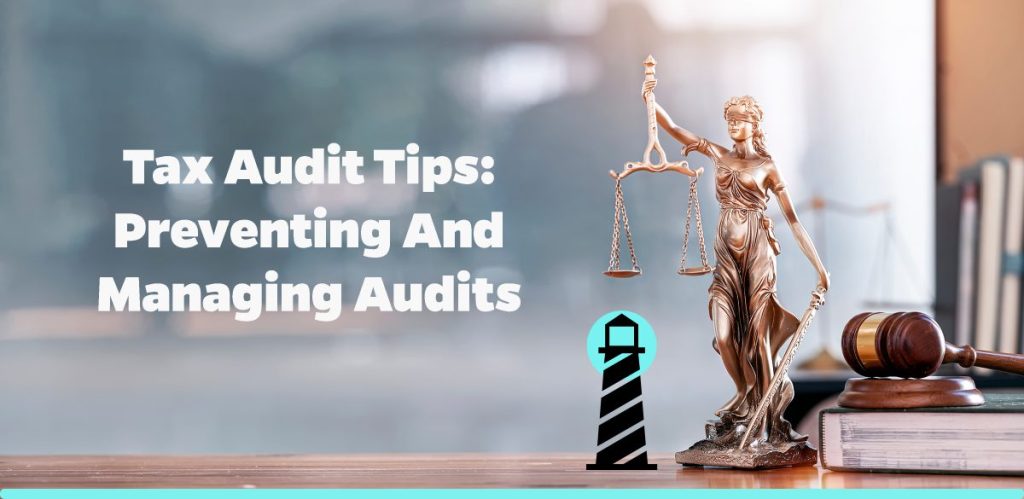## What is a Tax Audit?
A tax audit is a detailed analysis and review conducted on your financial statements, invoices, and other pertinent financial records. The Internal Revenue Service (IRS) oversees these audits and is authorized to carry out tax audits to ensure accuracy and compliance with established tax laws. Understanding the process and requirements can greatly reduce the discomfort and stress often associated with audits. This blog provides premier insights into effective strategies to prevent and cope with tax audits, in the ever-changing taxation landscape.
## Reasons for Undergoing a Tax Audit
Understanding why the IRS might choose your return for a tax audit can put you in a proactive stance. It is unknown how the IRS fully determines which taxpayers to audit but there are triggers and red flags that may make your return more susceptible. Some include:
– Income level: Higher income levels can trigger an audit as discrepancies can result in larger sums of tax dollars being owed.
– Types of income: Certain types of income are more likely to get audited. For example, self-employment income is far more scrutinized than wages.
– Inconsistencies in reported income or expenses: Discrepancies between your tax return and the information reported to the IRS by third parties can alert the IRS.
Remember, being audited alone is not a sign of wrongdoing. It simply signifies that the IRS is verifying the information provided on your tax return.
## The Tax Audit Process
In general, the IRS will begin by notifying you of the audit via mail. Various forms of audits exist, and they vary based on the depth of the examination. They include correspondence audits (done through the mail), office audits (at an IRS office), and field audits (at your home, business, or accountant’s office).
The letter from the IRS will specify the items in question and what information they will require from you. At this point, it is crucial to remain calm, organize your documents promptly, and consider hiring a professional such as Brightside Tax Relief LLC to help navigate the complex process.
Take note, all communication with the IRS should be documented for reference and in case of future disputes. If you have been selected for a tax audit, consider visiting their page on tax audits here.
## Preventing a Tax Audit
Prevention is crucial, whether in your personal or business finances. Here are strategies that may decrease the likelihood of an audit:
– Be honest: Do not attempt to falsify or exaggerate deductions or business expenses. Honesty is indeed the best policy when it comes to dealing with the IRS.
– Keep good records: If you have proper documentation for all deductions and income, it will not only ease the stress and confusion if audited, but it will help ensure your tax return is accurate thus reducing the likelihood of an audit.
– File on time: Late filings or late payments can result in penalties and increase the chances of an audit.
– Get professional help: Engaging experts like Brightside Tax Relief LLC can spot potential issues before filing your return, guide you throughout the tax filing, and provide invaluable help if audited.
## Managing a Tax Audit
Despite all your precautions and strategies, it’s possible that you may still face a tax audit. In this instance, consider following these steps:
– Comply strictly: Provide all the requested information promptly. Make sure documentation provided is accurate and complete.
– Consult professionals: If you ever feel overwhelmed, consulting a professional, such as an attorney or tax relief company like Brightside Tax Relief LLC, is advisable as they can guide you through the process and ensure you’re taking the right steps.
– Appeal the decision: If you disagree with the audit results, you have a right to appeal to the IRS Office of Appeals. Again, professional help would be advantageous here.
## Tax Audit Tips: A Recap
While facing a tax audit can be a daunting experience, these tips can aid in preventing getting flagged for an audit and managing one if it does occur:
– Understand why you might face a tax audit
– Have a comprehensive knowledge of the tax audit process
– Emphasize on prevention in your personal or business finances
– If audited, remain calm and take proactive actions
– Always consider the possibility of appealing the IRS’s decision
Admittedly, tax audits are complex and sometimes unavoidable. Nonetheless, long as you conduct your business honestly, keep thorough records, and enlist the help of professionals when needed, you drastically reduce the chances of an audit. If you are selected for an audit, you will be prepared to come out of it in the best possible position.




